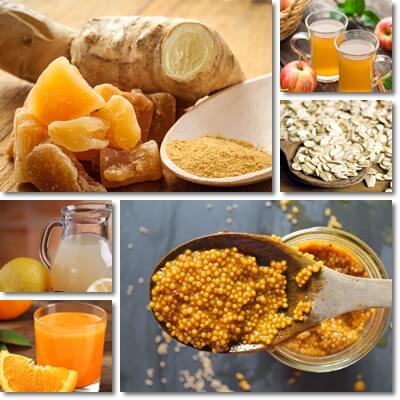When it comes to treating acid reflux as a condition of its own or managing it as a symptom of another digestive ailment, there is no easy solution. This is because acid reflux is often brought on by continual bad eating habits and one food will not automatically reverse years of poor dietary choices or overthrow the effects all of the bad foods in our daily diet. But the biggest issue with some of the most famous home remedies for acid reflux is the fact they do not take into account the nature of GERD and recommend foods and other remedies that add to the acidity instead of calming it, making them not only useless, but downright dangerous for health.
Blogs all around the web advise for the use of apple cider vinegar, lemon juice and, for the most part, highly acidic foods and remedies along with high fiber foods or strong spices, claiming benefits for acid reflux. But how can they recommend both apple cider vinegar or lemon juice (which are acidic) and baking soda (which is a base) at the same time? It can’t work both ways. You can’t treat acid reflux both by looking to add to the acidity which is what vinegar and lemon juice do and raise alkalinity to reduce acidity which is what the baking soda does.

Not to mention the fact that if acid reflux is a symptom of an underlying digestive condition such as gastritis, other recommended remedies such as ginger or other strong spices whose main active ingredients are essentially irritants further contribute to stomach lining inflammation and ultimately accentuate the stomach acidity. Like will all things, no food is universally healthy and no remedy may work the same for everyone, but if you are looking to treat or manage your acid reflux, then you need to make some major changes in your diet and lifestyle, excluding problematic foods like carbonated beverages, coffee, spices, high-fat foods, fried foods, junk food, processed foods and be sure to avoid these 8 useless and dangerous home remedies:
1) Apple cider vinegar
There are two reasons why apple cider vinegar is recommended as a remedy for acid reflux: first because it is assumed that, by increasing the amount of acidic juices in the stomach, digestion will occur faster which should help tone down acid reflux; secondly because it is assumed the the acid reflux occurs because there are too little gastric juices in the stomach to begin with and this causes the muscles that keep them in to interpret this as a signal to relax and let gastric juices escape into the esophagus.
However, acid reflux that needs treating is never a one-time deal, but rather the result of repeated bouts of acidity caused by eating problematic foods, eating too much or an underlying condition such as gastritis, also often caused by eating problematic foods. In response to problematic foods, more gastric juices are produced and this continues for as long as you enjoy a bad diet. Drinking apple cider vinegar, also an acid, will only add to the existing gastric juices and stomach acidity, not only irritating the stomach lining over time, but also contributing to the pressure existing gastric juices (or too much food) exert on the muscles keeping them in. This makes it more likely for them to escape into the esophagus at the next burp, bite of food, sip of water or minor effort.
Supposedly hurrying digestion along with apple cider vinegar, which doesn’t occur as efficiently as we are led to believe, won’t regulate the production of gastric juice and won’t stop you from having acid reflux the next time you eat problematic foods or simply the next time you eat. Chances are it will build on the existing acid reflux. Not to mention that as a long-term remedy, apple cider vinegar can lead to stomach lining erosion, gastritis, ulcers or full-on GERD, tooth enamel erosion and teeth sensitivity.

2) Lemon juice
Lemon juice is recommend for acid reflux either because it hurries digestion along which is supposed to reduce acidity or because it is an alkaline food. But hurrying digestion along doesn’t remove the cause of the acidity and, given that lemon juice is acidic (it contains citric acid), it also adds to the acid reflux. The fact that it is an alkaline food is irrelevant because foods are classified as either alkaline or acidic after digestion, based on the type of trace they leave in the body. When it comes to acid reflux, the concern is that lemon juice is acidic before digestion as it contains citric acid (basically another type of acidity, different from that in the alkaline diet). The citric acid adds to the existing stomach acidity and may easily amplify symptoms. Ask your doctor why people with GERD and gastritis are advised not to eat citrus fruits like lemon, lime or oranges with their conditions.
3) Ginger
Ginger may be good for many things, but treating acid reflux is not one of them (see article 7 Reasons not to Eat Ginger). To better understand why it’s a counterproductive food in the treatment of this digestive ailment, you have to understand how ginger works. The spice produces its often beneficial effects through several active constituents (gingerol, shogaols, zingerone) which also give it its spicy taste. But these active constituents are natural irritants and eating too much fresh or dried ginger can upset the stomach, irritating the stomach lining and triggering acid reflux.
The effects are proportional to the amount of fresh or dried ginger you eat. Turmeric is a spice related to ginger, with a similar action, although often less pungent. But when eaten in large amounts, it will produce stomach upset and cause stomach acidity, hence why it’s best to avoid eating turmeric if you have acid reflux (see article 5 Reasons Turmeric Is Bad for You).
Ginger tea is less of an irritant because the exposure to hot water inactivates some of the most pungent active constituents in the spice, diminishing it negative effects.
4) Fresh carrot juice and other vegetable or fruit juices
One medium-sized carrot (61 g) has 1.7 g of dietary fiber, while 1 large carrot (72 g) has 2 g of dietary fiber. Carrot juice has less fiber since it doesn’t contain much of the pulp, but even so, you can still get up to 2 g of dietary fiber per cup of carrot juice. When you eat more fiber than you need to, even assuming you enjoy excellent digestive health, you will experience side effects that range from bloating and loose stools to acidity and heartburn.
Too much dietary fiber creates air in the stomach which is often eliminated through eructation (burping). But as you burp, stomach juices get the chance to escape into the esophagus, resulting in acid reflux and heartburn, more so when you have a pre-existing gastritis or GERD. Symptoms are more severe if you eat problematic foods, have had a large or heavy meal or have a glass of juice afterwards.
5) Spicy mustard
Spicy mustard seeds or actual mustard are not what you want to eat when you have acid reflux. Any strong spice will further work up the stomach and gastric juices production will increase as you digest it, resulting in an even worse acid reflux. And since your esophagus is already burning from the acidity, why add another irritant such as spicy mustard to further accentuate inflammation of the esophagus lining?
6) Oatmeal
Porridge made from oatmeal is a bland food and, if consumed in limited amounts, it not only regulates intestinal transit and relieves constipation, but also provides good nutrition. However, other than its blandness that does not trigger stomach acidity, it does nothing to treat an actual acid reflux flare up.
7) Almonds
Probably the main reason why almonds are recommended for acid reflux is because they are alkaline. But their pH effect after digestion does nothing really for the acidity arising in the stomach during digestion of food. Even more, 100 g of almonds has 12.5 g of dietary fiber and 1 oz (28.35 g or 23 kernels) have 3.5 g of dietary fiber. This is quite a lot of dietary fiber and a too high a intake, especially when you have gastritis, can cause air in the stomach, burping and easily encourage gastric juices to escape into the esophagus.
8) Milk
Milk normally causes acid reflux and the more you drink, the worse the acid reflux is. The higher the fat content, the more it fuels stomach problems. Its apparent benefit for acid reflux flare ups is more likely the result of a non-acidic liquid washing down the stomach juices that have irritated the esophagus. Milk is also slightly creamy due to the fact that it contains fats and may help form a soothing film and calm the inflammation temporarily, but does not represent a treatment for the condition. If you, let’s say, lie down after drinking a glass of milk, then it’s likely it will also come up from the stomach together with gastric juices and cause an even worse case of acid reflux. It will probably be better to have several sips of water when you have gastric reflux, but not too much because a stomach full of liquids is just as bad as a stomach full of food.
What to do instead?
If you have acid reflux at least twice a week every week, it’s time to make an appointment with your doctor and investigate the causes behind it and receive medication if needed. If you are looking to manage your acid reflux, then make the necessary dietary changes and eat a clean diet consisting of foods you prepare yourself at home and avoid frying, fatty foods as well as problematic foods (see Foods to Eat and to Avoid for Acid Reflux). Some great remedies to help manage acid reflux include:
1) Pure Aloe vera gel taken on an empty stomach in the morning, at least 30 minutes before eating. Aloe vera is soothing and helps regenerate the stomach lining.
2) Raw, certified honey taken on an empty stomach in the morning. Honey forms a protective, thick coating on the esophagus and allows for healing. Remember though that honey is an allergen so make sure you are not allergic to it first.
3) Herbal teas for stomach health. Soothing herbal teas of your choice could help boost digestive health. Some of my favorites are chamomile and licorice. Remember to never drink the tea hot, but at room temperature and never add honey or sugar to it until it’s cooled down.
4) Lifestyle changes. Eat small meals often. Walk after every meal for 30 minutes to 1 hour. Don’t lie down 2-3 hours after eating. Eat at least 3 hours before going to sleep. Avoid drinking too much water before, during and right after eating. Half an hour to 40 minutes before and after a meal is fine.
5) Follow a bland diet. If your acid reflux is at its worst, you can try a bland, gastritis diet for a couple of weeks to enjoy relief. In very few words, a gastritis diet would entail eating less fiber, more lean protein, white bread, pasta, nothing fried, fatty, fermented or processed.
